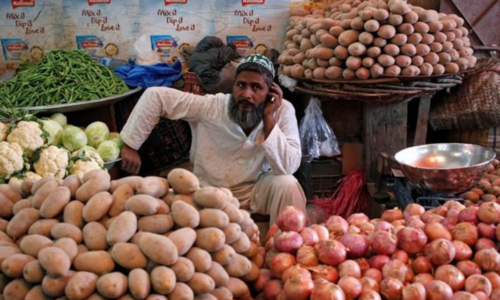ISLAMABAD: Prices of consumer goods continued to rise in December as inflation edged up to 12.3 per cent from 11.5pc, the largest increase recorded in nearly two years, according to the Pakistan Bureau of Statistics (PBS) data released on Saturday.
Inflation — measured by the Consumer Price Index (CPI) — has increased to its highest level in 21 months — driven by a record rise in global oil prices, undermining earlier gains.
It may be noted that the recent rise in oil price prices was the highest ever in the country’s history, which is expected to lead to an increase in the cost of food items due to higher transportation charges.
The year-on-year increase in inflation in recent months is mainly driven by soaring prices of fuel, electricity, house rent, transport and non-perishable food items.
Food inflation is still on the higher side; in urban areas it has shot up to at 11.7pc in December on a yearly basis and a decline of 2.3pc on a monthly basis, whereas the respective growth in prices in rural areas was 9pc and a decline of 3.1pc.
However, PBS data showed that in rural areas, non-food inflation was higher than that recorded in urban areas – a reversal of the trend that is usually witnessed where urban areas experience higher inflation.
According to a finance ministry report, global commodity prices surged to unprecedented levels, putting pressure on currencies and pushing inflation around the world to higher levels. The Food and Agriculture Organisation has estimated that world food prices have climbed by 27pc, a 10-year peak, while developed countries such as the US and UK had seen their highest-ever increases in inflation.
In Pakistan, the average inflation between July and December 2021 rose to 9.81pc on a yearly basis.
After surging to 12.4pc in February 2020, inflation had been on the decline – helped by a drop in prices of agricultural products. However, the massive spike in oil prices earlier this year has reversed this trend.
In 2020-21, annual CPI inflation was recorded at 8.90pc against 10.74pc the previous year.
The Economic Adviser’s Wing (EAW) of the Ministry of Finance, in the December edition of its Economic Update & Outlook, explained that Pakistan’s inflation rate was driven by “the international commodity prices, exchange rate, seasonal factors and economic agents’ expectations concerning the future developments of these indicators”.
A massive depreciation of the rupee has also fuelled import-led inflation, while the withdrawal of sales tax exemptions on imported food items is also expected to accelerate the rate of inflation in the coming months.
At the same time, prices of meat, fruits and vegetables have also registered a persistent increase in major urban and rural centres.
Non-food inflation in urban centres increased by 13.4pc year-on-year and 2pc on a month-on-month basis, whereas in rural areas it rose by 14pc and 1.9pc, respectively. The increase in non-food inflation was mainly driven by a hefty rise in oil prices in December.
Food items that saw an increase in their prices in December as compared to the previous month, included cooking oil 6.02pc, fruits 4.81pc, gram whole 4.71pc, gram flour 3.17pc, milk 2.83pc, mustard oil 2.71pc, vegetable ghee 1.79pc, fish 1.54pc, rice 0.90pc, while among pulses masoor increased by 8.64pc, mash 6.58pc and pulse moong 2.75pc.
In urban areas, the prices of tomatoes declined by 49.74pc, vegetables 25.73pc, potatoes 19.76pc, chicken 18.34pc, onions 17.8pc, sugar 9.22pc, eggs 3.03pc and jaggery 1.28pc.
Core inflation in urban areas was 8.3pc in December as against 7.6pc the previous month. In rural areas, the corresponding increase was 8.9pc as against 8.2pc.
The State Bank determines the key policy rate — currently at 9.75pc — based on the core inflation rate.
Published in Dawn, January 2nd, 2022













































